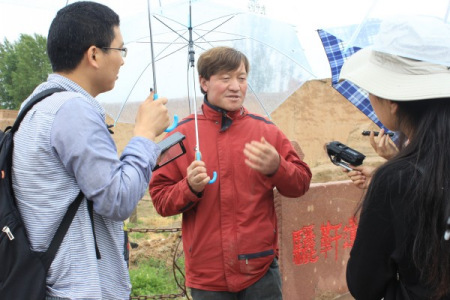
Sun Jianjun (C) receives an interview.
Sun Jianjun recalled the excitement when he stood on stage with Jackie Chan at the premiere of historical action film "Dragon Blade" months ago.
Although Sun did not act in the film, which tells the story of an alliance between a Han Dynasty (202 B.C. - 220 A.D.) general and a Roman warrior, he was invited to the premiere because he might be descended from a lost Roman legion.
Sun's hometown of Liqian, a remote village in Yongchang County on the edge of the Gobi desert in China's Gansu Province, attracted media attention in the 1990s when archeologists found remains of an ancient fort, which was similar to Roman defense structures. Many of the village's residents have green, deep-set eyes, hooked noses and blond hair.
Although DNA tests conducted in 2005 show some of the villagers are of "foreign" origin, many scholars argue that it does not necessarily mean they are descendants of the ancient Roman army, since the area is located on an international trading route.
The Roman army was headed by general Marcus Crassus, who was defeated and beheaded by a tribe that occupied what is now Iran in 53 B.C. But a 6,000-strong army led by Crassus's eldest son apparently escaped and was never found again.
It seems that the legends and debates about the village are enough proof for Yongchang. People there have turned their possible but controversial roots into a tourist attraction.
Situated along the Silk Road, a trade route established more than 2,000 years ago linking Asia and Europe, Yongchang could benefit from easier car access and the development of China's far west, said Ma Guoxing, the county party secretary.
Ma said the county has already built a replica of an ancient town with Roman architecture covering an area of 120,000 square meters.
A film and TV production base and a park are also under construction, and a total of 1,000 Romanesque pillars are being erected.
The efforts have yielded positive results.
Last year, Yongchang attracted more than 200,000 tourists from nearby regions, while the number is expected to exceed 500,000 this year, said Ding Yongqin, general manager of Liqian Tourism Development Company.
The legends have also attracted many foreign visitors. A travel agency in Beijing brought 40 Italian senior citizens to Liqian in 2012 to look for the possible Roman bloodline in western China, Ding said.
The tourism industry has gradually changed people's lives there. Most of the 320 villagers in Liqian have moved to the county seat for better jobs and education, and the number of hotels in the county has increased from 50 in 2010 to the current 150.
"There was no water in the village when I was a child. We relied on melting snow from the nearby mountain," said 42-year-old Sun Jianjun.
Sun's foreign-looking appearance won the former construction worker a job as a tourist guide in Ding's company in 2011.
Tourism is expected to become the biggest industry in Yongchang. The service industry could increase to more than 50 percent of the county's GDP by 2020 from the current 30 percent.
In order to make this ambitious plan come true, the county must better protect its claim to fame: more than 200 possible descendants of the lost Roman legion.
However, the story of their Roman ancestors may not bring happiness to all residents.
Luo Ying, who is nicknamed "Roman prince" by his fellow villagers, is tired of repeating the story to reporters and suiting up in armor and shield for visitors.
"The monthly salary of 1,800 yuan (290 U.S. dollars) is not enough to support my unemployed wife and two children," the 40-year-old said. He said he might change jobs in the near future.
Ma Guoxing believes things could turn better. The county will establish a performing arts company to hire people like Sun and Luo with higher pay.
"It is the archaeologists' and scientists' job to decode the mystery. What I care about most is how to explore our tourism resources and allow residents in this remote corner of China to get rid of poverty," he said.
Sun Jianjun is excited by Ma's promise. He plans to open a small shop to sell traditional food and other items, and tell more people about the mysterious story of his possible ancestors.
















































